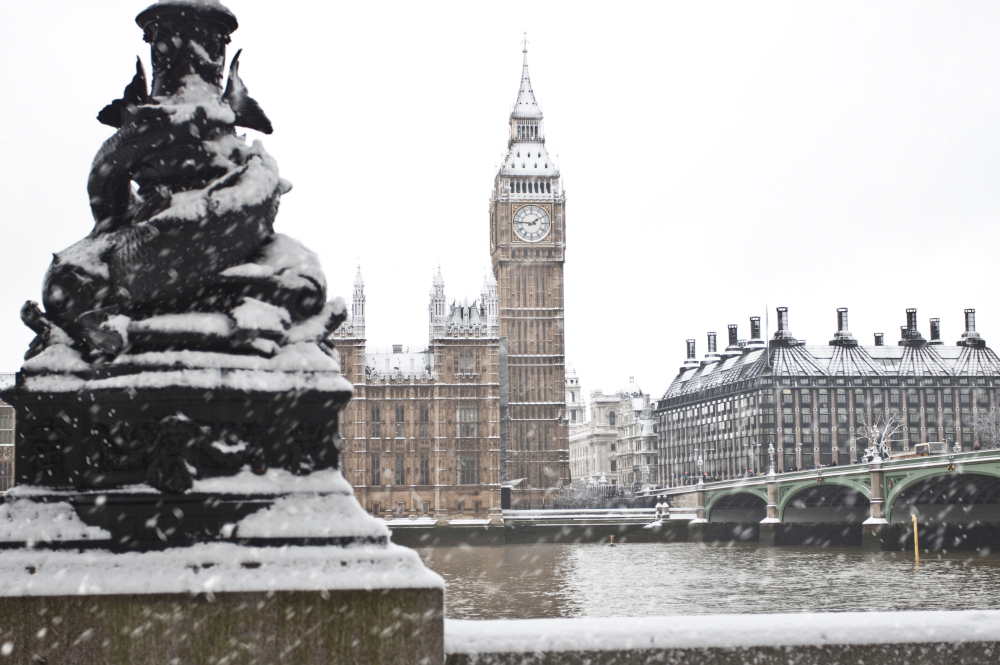Could Climate Change Make the UK Colder?

As we move into spring, the cold, dark days of winter seem to be long behind us, and with the effects of climate change increasing our global temperatures, there may be whispers of hosepipe bans in a few months’ time. But the UK could potentially get colder due to climate change, which could impact the country in years to come.
Atlantic Meridional Overturning Circulation (AMOC) Shutdown
The Atlantic Meridional Overturning Circulation (AMOC) is a conveyor belt that transfers heat, via water, from the Southern hemisphere to the Northern hemisphere; with the Gulf Stream representing one fifth of the system. Currently, the AMOC brings salty, warm water north, which then cools in the northern hemisphere causing the water to sink and return to the south.
However, dropping sea surface temperatures suggest that the AMOC is beginning to weaken, which could cause it to stop circulating or collapse. If the world continues to get warmer, due to greenhouse gases and melting ice sheets, then rainfall patterns would shift resulting in increased rainfall in the South, making ocean water less dense and therefore slower to move.
Temperature Changes
Although 2024 was the warmest year on record, Northern Europe could see a drop in temperatures in the next few decades due to the potential breakdown of the Gulf Stream.
Taking into consideration the effects of climate change, research suggests temperatures could drop a significant amount if this happens, potentially up to 10°C in the UK. With climate change temperature rises also taken into consideration, the UK could still see a change in conditions with the climate estimated to be 2-3°C cooler than pre-industrial times. This is because climate changes cause the extremes to become more extreme – with hotter continents getting warmer and cooler countries becoming colder.
Temperature Rise Impacts
The rising temperature of the Earth could lead to cooler temperatures in the UK, which would have a variety of impacts:
Agriculture
Colder temperatures would mean some crops wouldn’t be able to be grown in the UK due to frosts, meaning we would be more reliant on imports. This would put strain on UK farmers, many of whom would lose their livelihoods.
Natural Disasters
In recent years, the world has seen an increase in natural disasters largely due to climate change. Keeping in mind that the Earth has increased by just 1°C, if the UK climate falls by the suggested 2-3°C, it could cause a significant change in the environment and lead to even more natural disasters.
Infrastructure
The UK rail network cannot currently withstand cold weather, so colder temperatures and prolonged winters could heighten this, meaning upheaval for millions of people across the country.
Additionally, UK homes are not suited to very cold temperatures, and although brick helps to maintain heat to an extent, homes are not designed to withstand cold conditions for a long period of time. Furthermore, there is an increased number of homeless people, which would make them more vulnerable.
Energy
Colder weather would result in millions of people using more energy to heat their homes, thus putting further strain on energy supply which could lead to power shortages and outages. Energy suppliers may not be able to keep up with the demand for electricity, with the worst-case scenario meaning energy would need to be sourced and imported from elsewhere. Not only would this impact the economy, and raise energy prices for end users, but it would also impact the environment and result in pollution, thus making a never-ending cycle adding to the primary cause of climate change.
Health
A colder climate increases human health risks – colder weather in general increases the risk of illnesses and viruses, but it also puts vulnerable people at additional risk and worsens existing health conditions. Therefore, there may be calls for more vaccines to help the vulnerable in addition to the public. An increase in health issues would also put a strain on medical services, putting additional pressure on the NHS which is already pushed to the limit.
Additionally, rising sea levels threaten coastal communities, not only posing a risk to human health and life, but also potentially displacing communities and leaving them without a home.
Of course, it’s not just human health that would be affected. If the oceans get colder, it could damage marine ecosystems, impacting habitats and biosystems, leaving some animals unable to feed. This would greatly impact the food chain, creating knock-on effects from the top to the bottom.
Can We Prevent the Temperature Drop?
This all comes down to climate change, meaning the only way to prevent temperatures from increasing or decreasing and prevent the breakdown of AMOC or at the very least slow it down, is by reducing the amount of greenhouse gas emissions emitted into the atmosphere.
Additionally, scientists and politicians must continue working on creating and improving early warning systems and management for extreme weather events, which are increasingly prevalent in the world that we live in.


